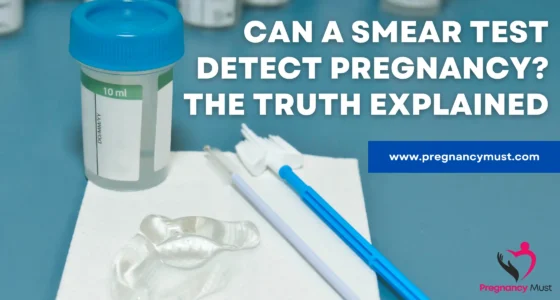“Baby looks everywhere but at me”- Are you wondering? Particularly in the early months when babies are acclimating to their surroundings, this behavior is typical. This can be perplexing for parents, especially if your infant appears preoccupied during feeding or private moments. But knowing why this occurs can allay some worries because it’s a normal aspect of their sensory development.
From the moment babies are born, their senses are in the early stages of development. Their sight is one of the last senses to fully mature, and during the first few weeks, babies are still learning how to focus and track objects. If you find the “baby looks everywhere but me” problem, it’s important to know that this is entirely normal and not a sign of anything being wrong.
Table of Contents
Baby Looks Everywhere But Me- Why This Happens?
Parents frequently experience a “baby looks everywhere but me” situation, particularly in the early months of life. Nonetheless, this behavior has a number of developmental causes, and being aware of them can reassure you. Let’s examine in more detail the causes of your infant’s roving gaze and how it relates to their cognitive and sensory development.
Baby’s Vision and Early Development
When babies are born, their vision is limited, and they can only focus on objects 8 to 12 inches away—perfect for looking at your face when held close. Since their visual system is still developing, they can’t see distant objects clearly. This natural curiosity leads them to shift focus to other things that capture their attention, like sounds or movement. This is why “baby looks everywhere but me” happens—they’re learning to process the world around them.
Baby’s Developmental Stages and Focus
A baby’s eyes are not yet fully developed at birth, so their ability to focus on distant objects is limited. Initially, they only see in blurry forms, with no real clarity on shapes or colors. In the first few weeks, your baby will be able to track objects and faces within a limited range, but they won’t be able to focus on things far away.
- At 1-2 months: Your baby will begin to improve their ability to focus on objects within a few feet, especially on faces. They may start to recognize you and begin paying more attention to your face. However, their gaze can still shift around due to their curious nature.
- Around 3 months: Babies’ focus sharpens further, and they can begin recognizing more details about their environment, such as distinguishing between different faces, objects, and shapes. At this stage, they are likely to focus on your face when interacting, but their attention may still wander at times.
- Beyond 3 months: Your baby will start to engage more consistently with you and objects, and distractions will become less frequent. As they learn to associate you with comfort and security, their focus on you becomes stronger.
Why Does My Baby Look Everywhere But Me When Breastfeeding?
One of the most common times parents notice their “baby looks everywhere but me” situation is during breastfeeding. This can be frustrating, especially when you want your baby to focus and latch properly. There are a few reasons for this, all rooted in their developing senses.
Immature Visual Focus:
Babies are still getting used to how their eyes work while they are nursing. They are learning to concentrate on a single object, such as your face or breast. A door opening, a shadow moving, or light reflecting off a surface causes them to easily get distracted. These stimuli distract from feeding.
Heightened Curiosity:
The first few months of a baby’s life are a time when innate curiosity is at its peak. There may be movements, noises, or lights they see while nursing. They may turn away as their eyesight improves because they are more attracted to their surroundings. They will eventually become more focused; this is normal and only temporary.
Development of Cognitive and Sensory Skills:
Breastfeeding is a sensory experience, not just nourishment. Babies are learning to coordinate sucking with visual and tactile input. As their brain develops, they process more of what they see, hear, and feel. They may glance around, but it doesn’t indicate a lack of interest in breastfeeding. It’s part of their development.
Baby Looks Everywhere But Me – 2 Months Old
At around 2 months old, babies become much more aware of their surroundings. This is a crucial developmental milestone as babies begin refining their focus and cognitive abilities. By now, they can more clearly see faces and shapes, and their ability to track objects improves. However, it’s also the time when babies start developing their curiosity further, which may cause them to look around more.
Increased Awareness:
At 2 months, babies will be more aware of their environment, including everything they see, hear, and feel. They are starting to recognize familiar faces, like yours, but they may still get distracted by external stimuli. Your baby might look at you, then shift their gaze to a bright light or a new object that catches their attention.
Better Visual Tracking:
While babies at 2 months are improving their focus, they are still learning to coordinate their vision with their movements. They may shift their gaze between you and other objects. Their focus isn’t fully developed, so it’s normal for them to look away from you occasionally, even though they’re becoming more aware of you.
Curiosity and Exploration:
As your baby’s brain develops, so does their curiosity. By 2 months, they’ll explore their surroundings in new ways. It may seem like your baby looks everywhere but me, but this behavior reflects their cognitive and sensory development. Distractions may be more frequent, but over time, they’ll become better at focusing on you and other important objects.
My 2-Week-Old Baby Looks Everywhere But Me – Should I Be Concerned?
If you’re concerned about your 2-week-old as you are experiencing “baby looks everywhere but me” situation, rest assured that this behavior is normal. At this stage in their development, babies are still adapting to the world outside the womb, and their senses are immature. They may look around, seem distracted, or appear to “ignore” you, but in reality, they are just adjusting to their new environment.
- Limited Visual Range:
Your baby’s vision is still hazy at two weeks. Anything over 12 inches will appear as a blur, but they can see things up close. As a result, they are less likely to concentrate on your face or anything outside of their narrow field of vision. As their vision improves, they will be able to focus better, though they will still likely glance around at the new stimuli in their surroundings.
- Developmental Phase:
Infants cannot yet focus for extended periods of time at this stage. Their innate exploratory behavior may cause them to turn their head in the direction of a light or sound. This does not imply a problem with their attachment or emotional bond; it is simply a normal developmental aspect of theirs.
- Tracking Ability is Still Developing:
At two weeks old, babies are only starting to learn how to use their eyes to track objects. They may move their head or eyes to follow things that catch their attention, but their ability to focus and track with precision is not yet developed. Over time, you’ll see them becoming more focused and engaged with the world around them.
- Increased Engagement in the Coming Weeks:
By the time your baby is around 4 to 6 weeks old, you will notice a dramatic improvement in their ability to focus. They will begin to look at your face more intently, and you may find they are more engaged during feeding and bonding time.
Baby Looks Everywhere But Me – Is It Normal?
When the “baby looks everywhere but me” situation is experienced, one of the first things many parents wonder is if there’s a problem. No, it’s not a reason for alarm. The typical developmental process includes this behavior. As part of their ongoing learning and exploration, babies are getting better at seeing, focusing, and tracking objects.
What to Do When Your Baby Looks Everywhere But Me
There are a few strategies you can employ to help your baby focus more on you, especially during moments like breastfeeding:
- Hold Your Baby Close to Your Face
During breastfeeding or bonding time, your baby will be more focused if you hold them close to your face. When faces are close, babies are more likely to interact with them, especially their parents’ faces. This strengthens the emotional bond as well.
- Reduce External Distractions
Because of environmental distractions, a baby might look everywhere but at you. Make an effort to create a peaceful environment with little visual or aural stimulation. During bonding activities like nursing or tummy time, a calm space with soft lighting can help them concentrate on you.
- Offer High-Contrast Visual Stimulation
High contrast colors, such as black and white, appeal to babies. Providing toys or pictures with a lot of contrast can help them focus better and stimulate their eyes. For this, simple toys with striking, contrasting patterns can work well.
- Be Patient
Above all, patience is key. Your baby’s ability to focus will improve over time. As they develop more advanced visual tracking and cognitive skills, they will naturally begin to focus more on you. This phase is temporary and will improve as they grow.
When Should I Be Concerned About My Baby’s Vision?
While most instances of a baby looking everywhere but me are completely normal, there are times when you might need to seek professional advice. If your baby is consistently unable to focus on faces or shows a lack of interest in objects by the time they reach 2-3 months, it may be worth discussing with your pediatrician.
Some warning signs to look for include:
- No eye contact or interest in faces by 2-3 months.
- Difficulty tracking moving objects.
- One or both eyes consistently turning inward or outward.
- Excessive tearing or sensitivity to light.
In most cases, these issues can be addressed early with medical intervention, and your baby will continue to develop their vision without complications.
FAQs on “Baby Looks Everywhere But Me”
Q: Why does my baby look everywhere but at me during breastfeeding?
A: Babies are inherently inquisitive and readily sidetracked by their surroundings, particularly when nursing. Since their eyesight is still developing, they might concentrate on other things, such as nearby sounds or motions.
Q: When will my baby start focusing on me?
A: By 2-3 months, babies begin to focus more on familiar faces, including yours. However, it may take some time for them to become fully engaged and consistently focused on you.
Q: Is it normal for my 2-week-old baby to look everywhere?
A: Yes, at 2 weeks old, your baby’s vision is still blurry. They can only focus on objects close to them and will be distracted by everything around them as they adjust to their new environment.
Q: What can I do to help my baby focus on me more?
A: Hold your baby close during interactions, reduce distractions, and offer high-contrast visual stimulation. The more you engage with your baby, the more they will learn to focus on you.
Conclusion: Baby Looks Everywhere But Me
If you’re experiencing a “baby looks everywhere but me” situation, don’t worry; it’s normal. Babies have an innate curiosity, and during the first few months of life, their vision is still developing. As they mature, they will start to pay more attention to you, but in the interim, you should be understanding and encouraging. As their skills continue to develop, I enjoy watching them explore the world in a peaceful, distraction-free setting. As their vision improves, your baby will be able to focus better, and before long, they will be looking at you with the affection and care that come with their close relationship.
Explore our Q&A for helpful tips and essential guidance.









